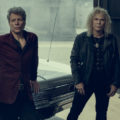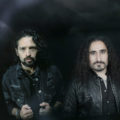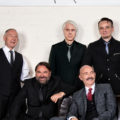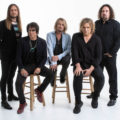Unmatched metal man Geoff Tate keeps moving on from Queensrÿche towards Sweet Oblivion
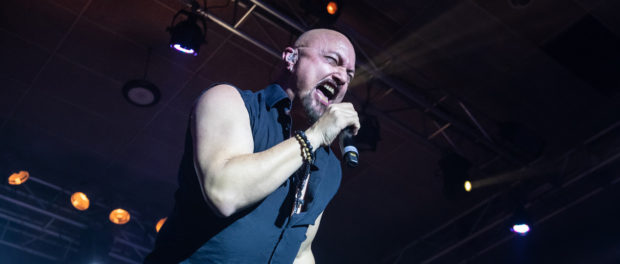 Photo provided by Kevin Nixon
Photo provided by Kevin Nixon
Original Queensrÿche singer Geoff Tate is regularly ranked as one of hard rock and heavy metal’s outright finest, which is a standing that’s sure to continue after hearing “Relentless,” his second project under the Sweet Oblivion banner.
This time through, the ten adrenalized tunes are produced by “Italian metal maestro” Aldo Lonobile (Secret Sphere, Timo Tolkki’s Avalon, Archon Angel), hearkening back to classically-minded material of the 1980s and ‘90s, but with a contemporary edge.
Chicago Concert Reviews rang the pristinely high-pitched front man with for details behind the internationally assembled collection, thoughts on preceding multi-million sellers, “Operation: Mindcrime” and “Empire,” his role in the colossal Hear ‘N Aid collaboration, plus completely unplugging from the screams of stardom for the serenity of making wine.
How did you arrive at “Relentless” for the name of the new album?
 Tate: It was kind of a loose idea based around time. Time is relentless. It never stops, you know? A lot of the lyric content has to do with focusing on time spent with loved ones and people you care about, so that seemed to be sort of a theme that all the songs had.
Tate: It was kind of a loose idea based around time. Time is relentless. It never stops, you know? A lot of the lyric content has to do with focusing on time spent with loved ones and people you care about, so that seemed to be sort of a theme that all the songs had.
What are a few tracks that mean the most to you personally and why?
Tate: I wrote on four. Those are probably the most important to me since I had the most involvement with those. There’s one called “I’ll Be The One.” I thought the lyric, the melody and everything on that one was very touching. It’s a dedication of love to your loved one and reassurance that you’ll be there no matter what happens. I think that’s a strong message that probably a lot of people could relate to.
Your voice sounds ageless on the album. How do you take care of it?
Tate: I exercise a lot. I think that’s probably important. Your voice is dependent upon the strength of your body, so I think it’s important to be strong and healthy. I balance that sort of healthy outlook with a considerable amount of drinking. Don’t want to be too healthy or too sober, so I try to keep a balance. Honestly, I’ve just been really lucky with my singing voice. I’ve been pretty healthy all my life. I’ve never had an operation. I’ve never broken a bone in my body. Gosh, I’m 62, so if I haven’t caught anything by now or been hit with anything, I think it’s gonna be clear sailing ‘til I can’t stand up anymore [laughs], which I hope comes later than sooner.
Was everyone able to record together in person or was it a case of swapping files?
Tate: Both Sweet Oblivion albums have been recorded in multiple studios around the world and none of us were in the room [together]. It’s the way things are done nowadays anyway if you are working with international musicians. We record in our own studios and then we pass files back and forth until we get the song the way we want it. Then we start passing around the different mix files in order to mix the record. It’s a fantastic, efficient way to work. This record was very enjoyable. I was in Ireland. [Guitarist] Aldo [Lonobile] was in Italy. A couple of the other guys were in Sweden I think.
What made you go the band route with these songs rather than the solo lane?
 Tate: Well, this was a project that Frontiers [Records] put together. Both of the albums are Frontiers and what they do is they bring me these guys and say “hey, this is Aldo,” although I’ve met Aldo before. “Aldo is a songwriter and a producer. Would you be interested in working with him?” I always say the same thing. “Let me hear what he’s got.” So Aldo will send me a bunch of his ideas, and if something grabs me, that’s really what it takes, like, “oh, okay, this I can relate to. I like this and it makes sense to me.” Before you know it, five months go by and we’ve made a record. That’s what it was like on the first album. That’s what it was like on this one.
Tate: Well, this was a project that Frontiers [Records] put together. Both of the albums are Frontiers and what they do is they bring me these guys and say “hey, this is Aldo,” although I’ve met Aldo before. “Aldo is a songwriter and a producer. Would you be interested in working with him?” I always say the same thing. “Let me hear what he’s got.” So Aldo will send me a bunch of his ideas, and if something grabs me, that’s really what it takes, like, “oh, okay, this I can relate to. I like this and it makes sense to me.” Before you know it, five months go by and we’ve made a record. That’s what it was like on the first album. That’s what it was like on this one.
I work every day in my studio, well, five days a week. I have hundreds and hundreds of songs. The challenge I’m having is where to put them right now because the whole record world has changed. It doesn’t make so much sense to be with a record label anymore like it once did and it doesn’t make sense necessarily to put records outs as albums anymore. People are putting a lot of individual tracks out now on their own. I’ve just been writing and collecting stuff. I figure at some point in the near future here, I’ll make a decision on what to do with certain songs or certain groups of songs. Some might be a solo album, some might be a project where I’ll bring in other people in to work with me.
To what degree, if any, is Sweet Oblivion an extension of Queensrÿche?
Tate: I think some of the musicians that played on the album are people that were inspired by Queensrÿche and different Queensrÿche records over the years, so there’s a similarity or something that sounds familiar to people. Then you have my voice, of course, which is unique and stands out on its own. I think the Queensrÿche comparisons will be inevitable really. Queensrÿche comparisons are inevitable on anything I do [laughs]. It becomes like, “well, that sounds like Queensrÿche” or “that doesn’t sound like Queensrÿche” [laughs].
Why do you think Queensrÿche’s “Operation: Mindcrime” became such a classic?
Tate: I don’t really know other than the fact that the topic is kind of a classic topic of “us against them.” It’s the topic of love lost or gained between two people. It’s a classic topic of the poor being oppressed by the rich. There’s some very classical elements to the storyline that I think people find familiar and comfortable. And then, of course, the characters themselves are pretty iconic and I think people relate to that. A lot of it is it’s also part of a generation. They grew up listening to it and hearing it.
 What are your thoughts on “Empire,” its even more commercially successful follow-up?
What are your thoughts on “Empire,” its even more commercially successful follow-up?
Tate: Last year, I was touring the 30-year anniversary of “Empire,” so I was playing the album in its entirety every night and it really struck me at that point. I hadn’t actually listened to the album in many years, so getting ready to do the tour, I was listening to it, remembering how to sing it, remembering the various songs and what they were all about. I was really struck by the fact that it’s a really good album.
It still stands up today and sounds great. I had a really great time playing it for the three or four months that we were on tour before it all got postponed due to COVID. I’m gonna be returning to that album starting in May. We have some dates in the Northwest that we’re going to be doing and then we’re going over the U.K. [where they are] opening now for concerts. If all goes to plan, if all the shows play, I’m booked until Christmas of 2023, which is strange to say but very true, and we’re gonna be playing the “Empire” 30-year anniversary tour.
Are there any concerts in Chicago from any point that pop out in your mind?
Tate: I pretty much always play the Chicago area when I come through the United States. It’s a huge market for my music and I have lots of loyal fans that always come to the shows. Does one stand out from the other? I couldn’t think if one would, but I know when I do play Chicago, it’s always a great time. It’s a great city. Man, people love music there.
This also marks the 35th anniversary of Hear ‘N Aid’s “Stars,” basically heavy metal’s answer to “We Are The World.” What do you remember about the all-star session?
Tate: It was a wonderful session. Yeah, it was amazing. I was very grateful and fortunate that [Rainbow/Black Sabbath/Dio singer] Ronnie James Dio called me and asked me to be a part of it. When I got there, I was surely not prepared for the amount of talent that was in that studio that day. There were so many people there, I can’t even name them all. Everybody wanted to be a part of it. There was a lot of momentum and good vibes with all the different musicians.
I was very young at the time. Gosh, it was like maybe the third recording I’d been a part of in my life. Ronnie brought me into the room with the microphone. He set me all up and goes, “here’s the lyrics, here’s the headphones. I’ll be behind the glass. Just tell me what you need. You doing good?” I said, “sure,” and I’m shaking cause I looked through the glass into the recording room, and not only is Ronnie there, but Ted Nugent is there, [Judas Priest singer] Rob Halford is there, [Journey guitarist] Neal Schon is there and all these heavyweight musicians, who are highly respected, and they’re all watching me perform. No pressure [laughs]. I couldn’t even take my sunglasses off. I was hiding behind the shades I was so nervous.
 Between then and now, what are a few of your other benchmark moments?
Between then and now, what are a few of your other benchmark moments?
Tate: [There have been] many great shows. Queensrÿche played the Rock In Rio festival in ‘91. That was huge, the biggest show I’ve ever done, with 225,000 people. We had to get helicoptered into the stage. That’s a pretty interesting moment. Walking into the studio restroom and seeing [Led Zeppelin guitarist] Jimmy Page and [original Queensrÿche guitarist] Chris DeGarmo playing acoustic guitars was pretty amazing. Being the only band playing live on the Grammys, that was cool. Yeah, there’s been a lot of moments.
What’s left that you’d like to accomplish?
Tate: I’d like to do an instrumental album at some point. I have a lot of material already in that vein. I’d like to grow my own grapes for my wine [“Insania”]. I’m involved in my winemaking considerably, but I’m not involved in the actual farming aspect of it very much, just harvests, bottling, mixing and blending. But I really like the farming aspect of it a lot, so I think perhaps in my retirement years, I might invest in a tract of land and come up with my own grape varieties in order to make some kind of special wine.
How has wine making provided a yin to the yang to being a rock star?
Tate: I started making wine in 2007. That was my first vintage and I’ve consistently been releasing vintages ever since. Last year, 2020, was the first year I haven’t actually been to the winery at the making of the wine. My winemaker, Friedhelm [Rinklin], has done it all himself and he assures me that I’m gonna love the vintage. There was just absolutely no way to get to the winery and it is strange because I’m pretty hands on when it comes to the bottling and the blending of the wine each year. I really enjoy creating something other than mayhem [laughs]. It’s a nice change of your headspace and your environment. Winemaking is a slow process. I enjoy picking the grapes. I like the manual labor, being outside and everything about the whole process really. If I could just be a winemaker full time, I would do that.
For additional information on Sweet Oblivion featuring Geoff Tate, visit GeoffTate.com.

